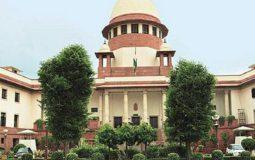New Delhi: In a significant development, the Supreme Court of India announced on Friday, October 13, that it will list a curative petition challenging the Maratha quota verdict for due consideration.
The decision came following the mentioning of the matter by Senior Advocate Maninder Singh before Chief Justice of India DY Chandrachud, urging for its urgent listing. In response, Chief Justice Chandrachud assured that the curative petition would be processed and listed.
The curative petition in question is aimed at challenging the judgment delivered by a 5-judge bench in May 2021. This judgment struck down the Maharashtra legislation, known as the Socially and Economically Backward Class (SEBC) Act 2018, which had provided reservation for the Maratha community in the socially and economically backward class category.
The bench’s verdict was grounded on the belief that it violated the principles of equality. As a result, the reservation granted to the Maratha community in employment and educational institutions was invalidated. The bench justified its decision by stating that there were no exceptional circumstances presented to justify breaching the 50% ceiling limit on reservations.
Additionally, the bench held, with a 3:2 majority, that after the 102nd amendment to the Constitution, states no longer possessed the authority to identify Socially and Economically Backward Classes. This aspect of the judgment had wide-ranging implications for similar reservations and quotas across different states in India.
It is noteworthy that in July 2021, the same 5-judge bench had dismissed several review petitions that were filed against the original judgment, including a review petition submitted by the Central Government. The latter had contested the verdict to the extent that it held that states were no longer empowered to identify SEBCs. Despite the various attempts at review, the bench stood by its earlier ruling.
The decision to list the curative petition against the Maratha quota verdict rekindles a debate that has garnered significant attention in India. This development holds the potential to influence reservation policies and their implementation, impacting various social groups across the country.
As the Supreme Court proceeds with the curative petition, the legal and constitutional implications of this case will remain under close scrutiny, as it could have far-reaching consequences on reservation policies and the distribution of opportunities for underprivileged communities in India.
















